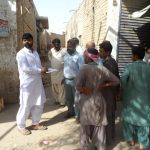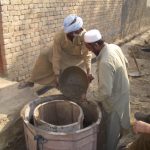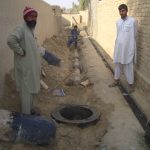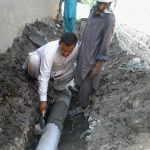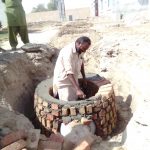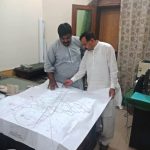The Low Cost Sanitation Program enables low income families to finance, manage and maintain sanitary latrines in their homes, underground sewerage lines in the lanes and secondary sewers (this constitutes internal development). Government is responsible to provide main sewers/box drains and treatment plants (i.e. external development). OPP-RTI provides social and technical guidance to both community and government facilitating partnerships. The model that has evolved from the program is the component-sharing concept of development with people and government as partners. It has evolved from a lane to the city/town. The program has extended to all of Orangi town (where 106,726 houses, have invested Rs. 122.61 million in secondary, lane sewers and sanitary latrines, with govt. investing Rs. 739.3 million on main disposals) and to 463 settlements in Karachi and 44 cities/ towns, also in 93 villages (spread mostly over the Sindh and Punjab Provinces) covering a population of more than 2 million. Together with 20 partner NGOs and a number of government organizations, the expansion of work continues. There is now city/town wide application. In 2003 the Punjab Government’s SPBUS program for 21 towns adopted the component-sharing model, work on external sanitation is nearing completion, while internal development by the community supported by partner organizations continues. OPP-RTI’s proposal for sewage disposal for Karachi is now the Karachi Water and Sewerage Board’s (KW&SB) S-III plan for the city (approved in December 2006), implementation is under process. Karachi Municipal Corporation continues to be supported with maps and designs for the development of the main “nalas” (the sewage disposals /drainage channels) as box drains – more then 70% of these have now been developed. Additional focus in Karachi is the infrastructure development (sewage/drainage disposal and water supply provision) in the 610 goths /villages (that have fast become urban settlements). In the National Sanitation Policy approved by the government in November 2006, the component-sharing model and lessons are included as policy measures to be adopted nationwide.
Youth program continues to train more community architects, technicians and surveyors. The mapping and documentation of drainage channels and infrastructure in settlements and goths of Karachi by the youth continues, it provides the basis for expansion of work. Maps and documentation of infrastructure of 553 of the total 2,735 settlements/goths and 16 out of 18 towns of Karachi are complete, together with the mapping of most of the drainage channels in the city. A Youth Technical Network has lately evolved bringing together youths of more then 20 partner organizations to understand, learn and strengthen each other (with mapping and technical skills).

